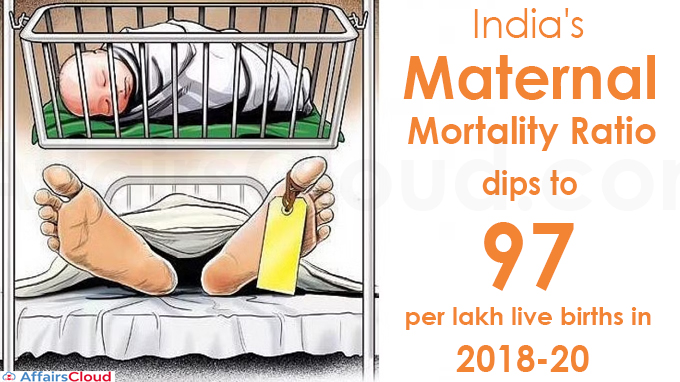
Highlights:
i.Assam has the highest MMR of 195 while Kerala has the lowest of 19 per lakh live births.
ii.Assam is followed by Madhya Pradesh with MMR of 173 per lakh live births and Uttar Pradesh 167.
iii.Kerala is followed by Maharashtra (33) and Telangana (43).
iv.MMR in Punjab and Haryana continues to be higher than the national average of 97.
- In Punjab, it is 105 deaths per one lakh live births and in Haryana it is 110 deaths.
v.The highest number of maternal deaths nationally i.e. 32% happened in the 20 to 24 year age group followed by 30% in 25-29 years and 20% in 30 to 34 years.
vi.At the adolescent level 15 to 10 years, there was 6% of all maternal deaths, indicating child marriages.
vii.The statistics of MMR are derived from Sample Registration System (SRS).
What is Maternal Mortality?
i.Maternal mortality in a region is a measure of the reproductive health of women in the area.
- According to World Health Organization (WHO), “Maternal death is the death of a woman while pregnant or within 42 days of termination of pregnancy, irrespective of the duration and site of the pregnancy, from any cause related to or aggravated by the pregnancy or its management but not from accidental or incidental causes.”
ii.Maternal Mortality Ratio which is defined as the number of maternal deaths during a given time period per 1,00,000 live births during the same period.
Points to be noted:
i.The target 3.1 of the Sustainable Development Goals set by the United Nations (UN) aims at reducing the global maternal mortality ratio to less than 70 per 1,00,000 live births.
ii.India is a signatory to the United Nations sustainable development goals (SDGs), which adopted a global MMR target of fewer than 70 deaths per 1,00,000 live births by 2030.
Some Interventions made by the Indian Government to reduce MMR in India:
i.Pradhan Mantri Matru Vandana Yojana (PMMVY) launched in 2017:
- It is a direct benefit transfer (DBT) scheme under which cash benefits are provided to pregnant women in their bank accounts to meet enhanced nutritional needs and partially compensate for wage loss.
ii.Labour Room Quality Improvement Initiative (LaQshya) launched in 2017:
- It aims to improve the quality of care in labour room and maternity operation theatres to ensure that pregnant women receive respectful and quality care during delivery and immediate postpartum period.
iii.POSHAN Abhiyaan launched in 2018:
- Its goal is to achieve improvement in nutritional status of children, adolescent girls, pregnant women and lactating mothers.
iv.Schemes such as Janani Shishu Suraksha Karyakram and Janani Suraksha Yojana have been modified and upgraded to Surakshit Matritva Aashwasan’ (SUMAN).
- Pradhan Mantri Surakshit Matritva Abhiyan (PMSMA) is particularly lauded for its focus on identifying high-risk pregnancies and facilitating their appropriate management.
Recent Related News:
i.NITI Aayog (National Institution for Transforming India) and the Council of Scientific & Industrial Research (CSIR), have jointly prepared a report “Assessment of Lead Impact on Human and India’s Response”, in July 2022, which found that India bears the world’s highest health and economic burden due to lead poisoning.
ii.According to the Global Multidimensional Poverty Index 2022, which is titled “Unpacking Deprivation Packages to Reduce Multidimensional Poverty”, 415 million people in India have been able to liberate from poverty over a 15-year period between 2005–2006 and 2019–21, which is a “historic change.”
About Registrar General and Census Commissioner of India:
Registrar General and Census Commissioner of India– Dr. Vivek Joshi
Parent Ministry– Ministry of Home Affairs
Headquarters– New Delhi, Delhi